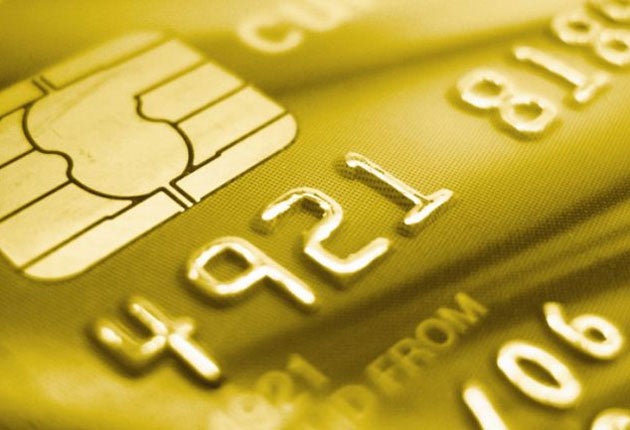Now banks raise credit card costs

Banks have increased interest rates on credit and debit cards held by tens of millions of shoppers despite the cost of borrowing falling to its lowest level for more than 50 years, research for The Independent reveals today.
The Bank of England has almost halved its base rate from 5 to 3 per cent since May, but during the same period the average annual percentage rate for credit cards has climbed from 17.2 to 17.6 per cent. Store cards – already in the spotlight after being accused of carrying excessive rates – have hit a peak of 25 per cent, and the high street chains Principles, Karen Millen and Oasis have raised charges for their in-store cards by 4 percentage points – almost a sixth – to 28.9 per cent.
More than £200bn is owed by Britons in unsecured borrowing, including personal loans, overdrafts and credit and store cards – almost one-fifth of total lending.
While the banks have been heavily criticised for failing to pass on the Bank of England's interest rate cut to their customers, so far providers of "plastic" – which include the same banks and some specialist players – have escaped scrutiny for failing to do likewise with their credit cards.
A study of 240 credit cards for The Independent by the banking research group Defaqto shows that between May and November the average interest rate has risen by 0.4 per cent. Some have risen faster – such as the NatWest credit card, which has risen from 13.9 per cent to 16.9 per cent, while HSBC's credit card and the Virgin Money Mastercard have both climbed one percentage point to the same mark. Credit card companies have also raised charges for withdrawing money from cash machines in Britain and abroad.
Statistics from the financial website MoneyExpert.com show that average rates for 33 store cards from major high street chains such as Argos, House of Fraser and Marks & Spencer rose from 24.4 per cent to 25.4 per cent.
The Creation Account Card, which can be used in stores including Sainsbury's, Woolworths, JJB Sports and Selfridges, charges 30.9 per cent APR for payment other than by direct debit. Burton's card charges 29.9 APR on payment by any means. Only one store card, from Fortnum and Mason, boasts an APR which, at 15.3 per cent, is below the credit card average.
Financial experts warned shoppers to use the cards stintingly, if at all. Sean Gardner, the director of MoneyExpert.com, said: "When it comes to borrowing, [store cards] are a complete rip-off. But with other forms of credit running dry, desperate consumers [may] be tempted into expensive deals as a last resort for Christmas." Research from last year showed that one in 10 people was still clearing Christmas debts from 12 months ago.
David Black, of Defaqto, said that credit card companies were probably trying to recoup the cost of bad debts, rising levels of fraud and customers making use of 0 per cent balance-transfer discounts. Falling sales of payment protection insurance, following a high-profile consumer campaign against rip-off rates, also meant less revenue for card providers. Customers were penalised for staying loyal when they should be looking around for the best rates, he suggested.
Get a free fractional share worth up to £100.
Capital at risk.
Terms and conditions apply.
ADVERTISEMENT
Get a free fractional share worth up to £100.
Capital at risk.
Terms and conditions apply.
ADVERTISEMENT
But Apacs, the payments association that represents credit card providers, said banks did not set credit card rates according to the Bank base rate: "While the interest rate is considered when [rates] are set, you must also factor in the cost borne in providing the service." A spokesman added that the gap between the base rate and the average credit card APR was at "historically low levels ... Essentially, the credit card market is extremely competitive."
Which?, the consumer group, warned customers not to put spending on store cards. Teresa Fritz, Which? personal finance campaigner, said: "We would say to consumers: there are better places to borrow. Never borrow on a store card. Even for people with a poor credit history or no credit history, there are better places to go; credit unions being one." Ms Fritz added: "People take store cards after being told: 'You get 10 per cent off if you take out one today,' without thinking about the rate of interest."
The Liberal Democrats said card companies that had passed on rises in the base rate should do the opposite when they fall. "Store cards already charge huge rates of interest to often unknowing and vulnerable customers," a spokesman said. "This adds insult to injury."
Join our commenting forum
Join thought-provoking conversations, follow other Independent readers and see their replies
Comments
Bookmark popover
Removed from bookmarks